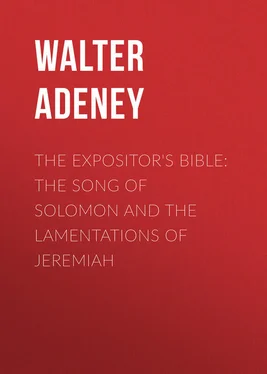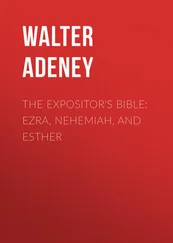Walter Adeney - The Expositor's Bible - The Song of Solomon and the Lamentations of Jeremiah
Здесь есть возможность читать онлайн «Walter Adeney - The Expositor's Bible - The Song of Solomon and the Lamentations of Jeremiah» — ознакомительный отрывок электронной книги совершенно бесплатно, а после прочтения отрывка купить полную версию. В некоторых случаях можно слушать аудио, скачать через торрент в формате fb2 и присутствует краткое содержание. Издательство: Иностранный паблик, Жанр: foreign_religion, foreign_antique, foreign_prose, на английском языке. Описание произведения, (предисловие) а так же отзывы посетителей доступны на портале библиотеки ЛибКат.
- Название:The Expositor's Bible: The Song of Solomon and the Lamentations of Jeremiah
- Автор:
- Издательство:Иностранный паблик
- Жанр:
- Год:неизвестен
- ISBN:нет данных
- Рейтинг книги:3 / 5. Голосов: 1
-
Избранное:Добавить в избранное
- Отзывы:
-
Ваша оценка:
- 60
- 1
- 2
- 3
- 4
- 5
The Expositor's Bible: The Song of Solomon and the Lamentations of Jeremiah: краткое содержание, описание и аннотация
Предлагаем к чтению аннотацию, описание, краткое содержание или предисловие (зависит от того, что написал сам автор книги «The Expositor's Bible: The Song of Solomon and the Lamentations of Jeremiah»). Если вы не нашли необходимую информацию о книге — напишите в комментариях, мы постараемся отыскать её.
The Expositor's Bible: The Song of Solomon and the Lamentations of Jeremiah — читать онлайн ознакомительный отрывок
Ниже представлен текст книги, разбитый по страницам. Система сохранения места последней прочитанной страницы, позволяет с удобством читать онлайн бесплатно книгу «The Expositor's Bible: The Song of Solomon and the Lamentations of Jeremiah», без необходимости каждый раз заново искать на чём Вы остановились. Поставьте закладку, и сможете в любой момент перейти на страницу, на которой закончили чтение.
Интервал:
Закладка:
3 3 i. 9.The word in the Hebrew means no more than my friend . When Solomon first appears he addresses the Shulammite with this title, and then immediately tries to tempt her by promising her presents of jewelry. Take another instance. In the beginning of the fourth chapter Solomon enters on an elaborate series of compliments describing the beauty of the Shulammite, without a single word of affection. As she persists in withstanding his advances her persecutor becomes abashed. He shrinks from her pure, cold gaze, calls her terrible as an army with banners, prays her to turn away her eyes from him. On the theory that Solomon is the accepted lover, the beloved bridegroom, this position is quite unintelligible. Now turn to the language of the true lover: "Thou hast ravished my heart, my sister, my bride; thou hast ravished my heart with one look of thine eyes."
4 4 iv. 9.
A corresponding difference is to be detected in the bearing of the maiden towards the rivals. Towards the king she is cool and repellent; but no dream of poetry can equal the tenderness and sweetness of her musing on her absent lover or the warmth of love with which she speaks to him. These distinctions will be more apparent in detail as we proceed with the story of the poem. It may be noticed here, that this story is not at all consistent with the theory that Solomon is the only lover. According to that hypothesis we have the highly improbable situation of a separation of the newly married couple on their wedding day. Besides, as the climax is supposed to be reached at the middle of the book, there is no apparent motive for the second half. The modern novel, which has its wedding at the middle of its plot, or even at the very beginning, and then sets itself to develop the comedy or perhaps the tragedy of married life, is not at all parallel to this old love story. Time must be allowed for the development of matrimonial complications; but here the scenes are all in close connection.
If we are thus led to accept what has been called "the shepherd hypothesis" the value of the book will be considerably enhanced. This is more than a mere love poem; it is not to be classed with erotics, although a careless reading of some of its passages might incline us to place it in the same category with a purely sensuous style of poetry. We have here something more than Sappho's fire. If we are tempted to compare it with Herrick's Hesperides or Shakespeare's Sonnets , we must recognise an element that lifts it above the sighs of love-sick youths and maidens. Even on the "Solomon theory" pure love and simple living are exalted in opposition to the luxury and vices of the royal seraglio. A poem that sets forth the beauty of a simple country life as the scene of the true love of husband and wife in contrast to the degradation of a corrupt court is distinctly elevating in tone and influence, and the more so for the fact that it is not didactic in form. It is not only in kings' palaces and amid scenes of oriental voluptuousness that the influence of such ideas as are here presented is needed. Christian civilisation has not progressed beyond the condition in which the consideration of them may be resorted to as a wholesome corrective. But if we are to agree to the "shepherd hypothesis" as on the whole the more probable, another idea of highest importance emerges. It is not love, now, but fidelity, that claims our attention. The simple girl, protected only by her virtue, who is proof against all the fascinations of the most splendid court, and who prefers to be the wife of the poor man whom she loves, and to whom she has plighted troth, to accepting a queen's crown at the cost of deserting her humble lover, is the type and example of a loyalty which is the more admirable because it appears where we should little expect to find it. It has been said that such a story as is here depicted would be impossible in real life; that a girl once enticed into the harem of an oriental despot would never have a chance of escape. The eunuchs who guarded the doors would lose their heads if they allowed her to run away; the king would never give up the prey that had fallen into his trap; the shepherd lover who was mad enough to pursue his lost sweetheart into her captor's palace would never come out alive. Are we so sure of all these points? Most improbable things do happen. It is at least conceivable that even a cruel tyrant might be seized with a fit of generosity, and why should we regard Solomon as a cruel tyrant? His fame implies that there were noble traits in his character. But these questions are beside the mark. The situation is wholly ideal. Then the more improbable the events described would be in real life, the more impressive do the lessons they suggest become.
Who wrote the book? The only answer that can be given to this question is negative. Assuredly, Solomon could not have been the author of this lovely poem in praise of the love and fidelity of a country lass and her swain, and the simplicity of their rustic life. It would be difficult to find a man in all history who more conspicuously illustrated the exact opposites of these ideas. The exquisite eulogy of love – perhaps the finest in any literature – which occurs towards the end of the book, the passage beginning, "Set me as a seal upon thine heart," etc., 5 5 viii. 6, 7.
is not the work of this master of a huge seraglio, with his "seven hundred wives" and his "three hundred concubines." 6 6 1 Kings xi. 3.
It is impossible to find the source of this poetry in the palace of the Israelite "Grand Monarch"; we might as soon light on a bank of wild flowers in a Paris dancing saloon. There is quite a library of Solomon literature, a very small part of which can be traced to the king whose name it bears, the greatness of this name having attracted attention and led to the ascription of various works to the royal author, whose wisdom was as proverbial as his splendour. It is difficult to resist the impression that in the present case there is some irony in the singular inappropriateness of the title.
The date of the poem can be conjectured with some degree of assurance, although the language does not help us much in the determination of this point. There are archaisms, and there are also terms that seem to indicate a late date – Aramaic words and possibly even words of Greek extraction. The few foreign terms may have crept in under the influence of revisers. On the other hand the style and contents of the book speak for the days of the Augustan age of Hebrew history. The notoriety of Solomon's court and memories of its magnificence and luxury seem to be fresh in the minds of people. These things are treated in detail and with an amount of freedom that supposes knowledge on the part of the readers as well as the writer. There is one expression that helps to fix the date with more definiteness. Tirzah is associated with Jerusalem as though the two cities were of equal importance. The king says: —
Читать дальшеИнтервал:
Закладка:
Похожие книги на «The Expositor's Bible: The Song of Solomon and the Lamentations of Jeremiah»
Представляем Вашему вниманию похожие книги на «The Expositor's Bible: The Song of Solomon and the Lamentations of Jeremiah» списком для выбора. Мы отобрали схожую по названию и смыслу литературу в надежде предоставить читателям больше вариантов отыскать новые, интересные, ещё непрочитанные произведения.
Обсуждение, отзывы о книге «The Expositor's Bible: The Song of Solomon and the Lamentations of Jeremiah» и просто собственные мнения читателей. Оставьте ваши комментарии, напишите, что Вы думаете о произведении, его смысле или главных героях. Укажите что конкретно понравилось, а что нет, и почему Вы так считаете.












